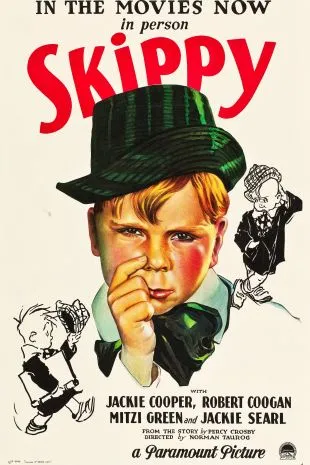
Skippy is a 1931 American pre-Code comedy film directed by Norman Taurog and based on the popular comic strip of the same name by Percy Crosby. The film stars Jackie Cooper, Robert Coogan, Mitzi Green, and Jackie Searl. It was released on April 5, 1931, and was distributed by Paramount Pictures. The screenplay was written by Joseph L. Mankiewicz, Don Marquis, Norman Z. McLeod, and Sam Mintz.
The plot revolves around Skippy (played by Jackie Cooper), the feisty son of a wealthy doctor, who tries to raise $3 so that his friend Sooky (played by Robert Coogan) can get a new pair of shoes. The film was well-received, earning several Academy Awards, including the award for Best Director for Norman Taurog at the age of 32, making him the youngest winner in this category until Damien Chazelle won for the 2016 film "La La Land". It also inspired a sequel called "Sooky" (1931).
Norman Taurog, who directed "Skippy," was an American film director and screenwriter known for his work in light comedy, drama, and complex narratives. He directed 180 films from 1920 to 1968. In early 1928, he directed his first feature-length film, "The Ghetto," which was later expanded with musical and dialogue portions directed by Charles C. Wilson for eventual release as "Lucky Boy" (1929).
Plot
Skippy is a 1931 American pre-Code comedy film directed by Norman Taurog. The plot revolves around Skippy, the mischievous son of a wealthy doctor, who meets Sooky in a poverty-ridden Shantytown, and together they try to save Sooky's pet from a cruel dogcatcher. The film is based on the popular comic strip Skippy by Percy Lee Crosby, which was distributed by King Features Syndicate and his novel of the same name.
Cast
- Jackie Cooper as Skippy
- Robert Coogan as Sooky
- Mitzi Green as Mitzi
- Jackie Searl as Jackie
Director: Norman Taurog
Distributor: Paramount Pictures
Release Date (Theaters): Apr 25, 1931
Themes & Reception
The themes of Skippy include childhood, friendship, poverty, and social class. The film portrays the innocence and playfulness of childhood, as well as the challenges faced by children growing up in poverty. It also explores the friendship between Skippy and Sooky, who come from different social classes but share a strong bond.
Skippy was well-received by critics and audiences alike. It was nominated for four Academy Awards and won one for Best Director for Norman Taurog. The film's success led to a sequel called "Sooky" (1931).
Challenges faced
One of the challenges faced during production was finding the right child actors to play the lead roles. Jackie Cooper, who played Skippy, was discovered by director Norman Taurog while he was playing in a sandlot baseball game. Robert Coogan, who played Sooky, was the younger brother of child actor Jackie Coogan.
Settings
The film is set in a poverty-ridden Shantytown, where Skippy and Sooky live. The contrast between their world and the wealthy neighborhood where Skippy's family lives is a central theme of the film.
Visual styles and techniques:
Skippy features a mix of comedic and dramatic scenes, with a focus on naturalistic acting and dialogue. The film also uses a variety of camera angles and techniques, including close-ups and tracking shots, to create a sense of intimacy and realism.
Trivia and fun facts:
- Jackie Cooper, who played Skippy, went on to have a successful career as an actor and director. He was the youngest actor to be nominated for an Academy Award for Best Actor at the age of 9 for his role in "Skippy."
- Norman Taurog, who directed "Skippy," went on to direct several other successful films, including "Boys Town" (1938) and "The Adventures of Tom Sawyer" (1938).
- The comic strip Skippy by Percy Crosby was a popular and influential strip in its time, and the character of Skippy became a cultural icon.